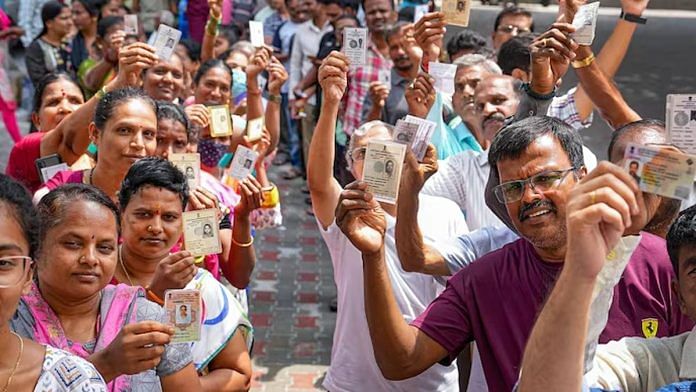Thank you dear subscribers, we are overwhelmed with your response.
Your Turn is a unique section from ThePrint featuring points of view from its subscribers. If you are a subscriber, have a point of view, please send it to us. If not, do subscribe here: https://theprint.in/subscribe/
For most democrats electing politicians is the essential feature to prevent a free society from becoming a dictatorship.
In the Parliamentarian System the Electorate determines both Legislative and Executive Branch via single ballot; on paper this system is to fill Government-institutions with experts suited to run a country, but in reality Parliamentarians / Alders weren’t selected for expertise or virtue, but fealty to Party-Presidents.
Switching to the Presidential System means the Electorate on paper votes for the President and each Parliamentarian independently, but here politicians irrespective of political affiliation tend to advance the interests of their patrons, usually their wealthy donors, who facilitated them getting elected and often ignore their actual voters (in favor of campaigning or fundraising); by that elite-capture becomes prevalent. In any case the Electorate essentially does not choose its rulers, they choose between whoever was put in front of them by special interests!
Questions are raised about the legitimacy of these systems! Politicians have little in common with the people they govern. Parliaments around the world are filled with crooks, criminals, frauds, imposters, illiterates or incompetent, uninformed, immature, lazy or questionable people. Rent-seeking or the perks of the office seem more on their mind than fulfilling duties of their office or campaign-promises. Elections create the illusion of choice, a circus masquerading as exercise of democracy.
Elections still make sense for Presidents / Mayors, but electing Parliamentarians / Alders simply does not justify the high cost, effort or divisiveness attached to campaigning; so an alternative is called for!
Sortition presents an elegant solution. It was first implemented in the democracy of ancient Athens. Instead of electing Parliamentarians / Alders, Members of those bodies are randomly selected from a pool of suitable applicants. It has been a widely debated alternative to elections to pry politicians from the hands of all powerful Party-Presidents without them falling prey to deep-pocketed donors.
- Removal of expensive time-consuming elections of Members of Parliament / Alder Board. Without elections politicians will no longer make unrealistic promises.
- A system with a random algorithm is more difficult to be manipulated than an election-system.
- Geographical Electoral Districts become unnecessary (ideal for nations with disputed borders like Israel).
- Members of Parliament / Alder Board don’t feel any pressure to reward political backers.
- Since success is the result of chance, an ambitious individual is less likely to apply or be able to help minions get elected into Parliament / Alder Board.
- Showmen have less ability to leverage star-power. The job of a Parliamentarian isn’t primarily to be a great orator standing at the lectern offering great speeches, but it ought to be a desk-job, perfect for nerds with attention to detail!
- The individuals, who end up in Parliament / Alder Board are independent from each other, not hampered by party-politics; they are free to cooperate with colleagues as they see fit.
- Parliamentarians / Alders will be real representatives of society, not elites or technocrats inside a bubble. One must have long-term faith in average people to grow into the role required for politics. Besides, Elected Officials (unlike Bureaucrats) don’t require extensive subject-matter expertise, but life-experience, wits, understanding of history and common-sense. In fact, from the moment of foundation India has been governed by highly-trained experts; their schemes failed nonetheless.
Any downside of Sortition can be found in other election-systems, but despite the various shortcomings, Sortition may still be both cheaper and better!
Key to making Sortition work is a highly transparent process with solid rules to properly screen applicants for the Sortition-process and clearly communicated expectations from the Elected Office (high work-load, shared long-term liability, etc.). Any (financial) gains may only materialize with good job-performance. Both before and in office must an inapt policy-maker face constant accountability by constituents with a real possibility of getting removed at any time. With the power of parties and donors eliminated, low hurdles for newcomers, attention-seeking no longer being rewarded, Parliamentarians can finally focus on upholding the Constitution and serving their constituents.
If all that creates Parliamentarians / Alders with bland political profiles, so be it! In a libertarian society the President / Mayor sets the agenda, while Parliamentarians / Alders provide a check on that agenda; they are not to have agendas themselves!
After an initial period of adjustment to the new system, Parliament / Alder Board may likely perform equal to or even outperform the current band of individuals occupying those seats. Serving in Parliament / Alder Board would resemble Jury-duty. Broad acceptance will follow, when people see the system, despite lack of elections, delivering for them. Important to a democracy aren’t elections, but overall choice and accountability!
One may learn from the almost forgotten wisdom of the first democracy to heal the largest democracy, not from the habits of the loudest democracy.
These pieces are being published as they have been received – they have not been edited/fact-checked by ThePrint.

